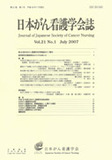Japanese
English
- 販売していません
- Abstract 文献概要
- 参考文献 Reference
- サイト内被引用 Cited by
要旨
本研究の目的は,化学療法を受けながら転移や増悪を体験した消化器がん患者の治療継続における情緒的反応を明らかにし,看護支援の検討を行うことである.
参加観察法,および半構成的面接法により対象者10名からデータ収集を行い,質的帰納的手法を用いて分析を行った.
その結果,情緒的反応の過程には,局面1【期待やためらいの狭間で化学療法を始める】,局面2【生と副作用のバランスを計りながら化学療法を継続する】,局面3【がんの悪化で心が乱れる】,局面4【がんと向き合う姿勢を整え直す】が存在し,一連の情緒的反応のタイプとしては,『感情貫き型』『感情統制型』『体験感情順応型』『ジレンマ型』の4つが明らかとなった.
化学療法を受けながら転移や増悪を体験した消化器がん患者の情緒的反応過程では,すべての局面において治療継続という同一の意思決定を行っていても,「化学療法を継続すること」に対する意味づけには個々に相違がみられた.また,意思決定における患者の主体性は,個々の内省と外的環境などにより違いが現れると考察された.
がんの進行に伴う治療についての患者の意思決定に関連した看護支援としては,未来への不確実性に苦しむ患者に対して時を得た介入が可能となるよう,医療チームにおける看護師の役割を確立し,初期治療が提示されるときから患者や家族に関わることが重要であると示唆された.
Abstract
The purpose of this study is to make clear the emotional reaction process concerning treatment continuance for digestive cancer patients who had experienced metastasis or exacerbation of cancer during chemotherapy and to examine their nursing support.
Data was collected from 10 participants through participant observation and semistructured interviews, which were analyzed by qualitative inductive analysis.
As a result, 4 phases were found in the emotional reaction process. Phase 1: "Beginning chemotherapy under both hope and hesitation", Phase 2: "Continuance of chemotherapy as the balance between life and side effects is weighed", Phase 3: "Emotional disorder due to cancer deterioration", and Phase 4: "Readjusting oneself to face cancer itself". In the series of emotional reactions, 4 types of reactions were clear: "emotionally expressive type", "emotion-controlling type", "experience-mediated emotion adaptational type", and "dilemma type".
In the emotional reaction process of digestive cancer patients who experienced metastasis or exacerbation during chemotherapy, each patient gave a different meaning in "chemotherapy continuance", in spite of the fact that all patients decided to continue treatment upon all phases. Also, it has been observed that independence of patients in decision making differed depending on the patient's introspection and external environment.
As for nursing support concerning patient decisions on treatment accompanying cancer progression, it is important that the roles of nurses in a medical team be established and that patients and their family could receive guidance from the point of initial treatment presentation so that patients suffering from the uncertainty of the future could receive guidance at the right moment.
Copyright © 2007, Japanese Society of Cancer Nursing All rights reserved.


